- Products
- All Products
- RF PA Extension Kit
- Wireless Microphone Upgrade Packs
- In-Ear Monitor Upgrade Packs
- Wireless Microphone Antennas
- Wireless In-Ear Monitor Antennas
- Antenna Distribution for Microphones
- Antenna Combiners for In-Ear Monitors
- Multi-Zone Antenna Combiners
- Spectrum Tools
- Accessories, Cables and Parts
- Solutions by Venue
- Resources & Training
- Performance Tools
- About Us
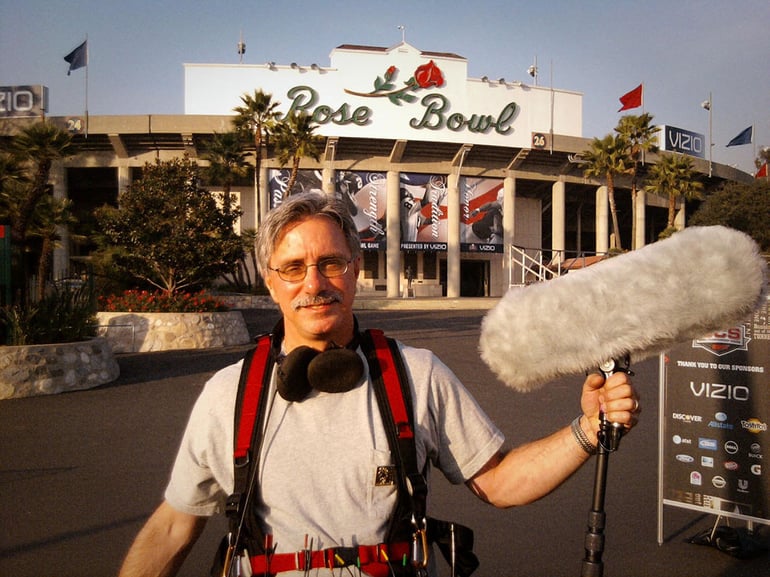
Almost exactly two months ago, a 328 lb defensive lineman ran out of a paper mâche tube filled with purple smoke, and knocked Bernard Beaudry off his feet and onto the turf.
Before the collision, Bernie (he goes by Bernie) was staffing the parabolic microphone utility position at his home field, Vikings Stadium in Minneapolis, capturing audio effects from the field during FOX Sports' Sunday Football.
After the collision, he was a focal point of journalist and social media attention everywhere American football is played.
I had the pleasure of speaking with Bernie a few days after the event. He even pulled his car over to the side of the road for two hours to speak with me. We talked about the incident—sure—but more so, we talked about Bernie’s career as a studio tech, location mixer, his passion for the deft craftsmanship required for good parabolic microphone operation, and faithfulness to an unshakable professional ethos as a sound operator for broadcast sports.
While emailing around for his contact, I found nearly everyone involved in sports production on the national stage knows Bernie. Not only do they know him, they deeply respect his talent for capturing impactful sound, and his rare personality: one of unstoppable work ethic paired with sincere kindness, extended to everyone he meets; I can vouch for this after speaking with him for just a while.
I’m not going to post the collision.
Google it if you must, but come back here for the full portrait of Bernie Beaudry: the parab operator, the human being, the definition of tough.
*(Interview originally conducted 12.04.16)
A: The first thing I want to ask, right out of the gate, is are you a football fan?
B: [laughs] Yes I am!
A: You are.
B: I grew up as a Packers fan. Where I grew up was only about 130 miles from Green Bay. In the UP of Michigan.
A: The reason I ask is because of a conversation I had with Karl Voss, Head Game Day Coordinator for the NFL's RF program. One interesting thing he told me was that he finds the best coordinators aren’t football fans, because they keep their minds on the job, not on the game. What do you think?
B: You know, even though I’m a fan, when I get on the field, it’s all business. I don’t internalize. I don’t root. Yes, in the back of my mind, I can say ‘oh cool.’ But it is a job I’m doing, and I believe it [fanship] actually helps me do the job, because when I’m watching a game at home I know what I like to hear.
A: So as a fan, you know the specific sounds you’d like to hear, or not hear?
B: Right.
A: May I ask what your job title is?
B: Well, that’s kind of a complex answer. Basically, I am a freelancer. I have many employers. The work I do with FOX and CBS is only one of the things I do.
My main focus is location sound. I wear a sound bag and carry a boom, and have wireless, and so on. I’ve been doing that longer than sports A2 and utility.
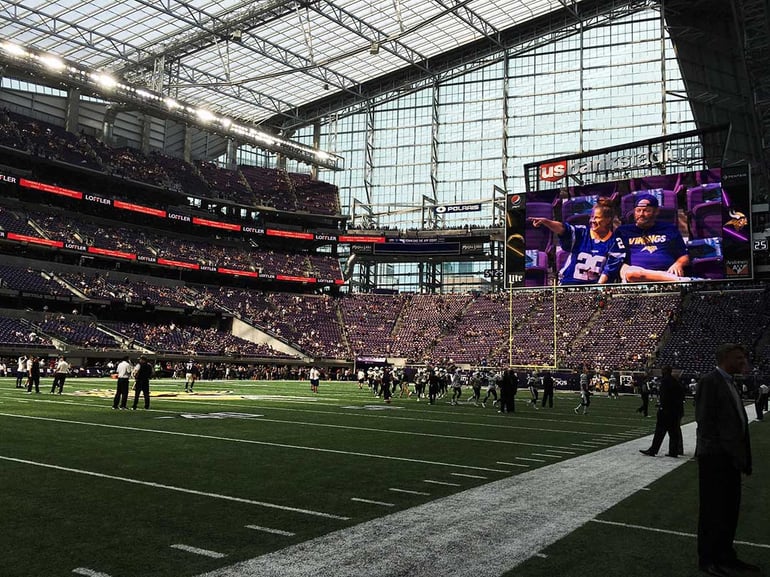
Vikings Stadium Consortium/U.S. Bank Stadium. © Bernard Beaudry.
A: So you’ve worked films and TV shows?
B: I’ve only worked on one film and it was only one scene. I’ve worked on commercials, I’ve been a regular sound mixer on probably eight or nine series. Primarily home improvement shows on the DIY Network and HGTV. I just recently got off a six and half year run, on a show called Bath Crashers.
A: Did you say “Bath Crashers”?
B: Yes. It’s part of the Crashers franchise. Kitchen Crashers, Yard Crashers, House Crashers.
A: A lot of damaging of important spaces going on there. And sounds like a varied career. What else have you done?
B: Here is a loose chronological order of my career and of how I got started. I moved to the Minneapolis St. Paul area in 1977 to take an Assistant job at Sound 80. It was a 2” 24 track studio. Right on the edge of the digital age. I was there for roughly five or six years. I worked on Funkytown, as an assistant on those sessions, and helped with Prince’s demo sessions, before he got his Warner Brothers contract. I actually loaned him a guitar for a track.
A: Uhhhh...
B: As an assistant I would patch all the outboard gear and set up all of the mics before the engineer came into the control room to start the session. There were four different engineers. And they all had a different style. The guy on the Funkytown sessions, David Z, he was more of a ‘go with the flow’ guy. He did whatever it took to get the sound he was looking for. Then there was Paul Martinson, kind of a mentor to me. He reengineered part of Blood on the Tracks. The Bob Dylan album. There was Tom Jung. He was very technical and would use time saving techniques because he mixed a lot of 30 second jingles. Finally, there was Scott Rivard, a designer of sound systems and an exceptional engineer. He went on to engineer A Prairie Home Companion for years. I learned a lot from those guys.
The studio eventually disbanded and one of the owners, Herb Pilhofer, introduced me to a TV producer and told me, ‘this is the direction you should go in, doing sound for TV or film.’ Right around 1981. I started freelancing for two years or so, for TV. I owned a Nagra. Eventually I bought some wireless.
A: You were using wireless in the early eighties? You must have been using VHF?
B: Yes, that was all that was available at the time. I bought two big Cetec Vegas. They were VHF, and I thought I was cutting edge.
A:. Well I’ve heard from a lot of people that they were cutting edge.
B: The receivers were probably four inches wide, eight inches deep, and like two inches tall. So they didn’t really fit in a bag. They also ran on four nine volt batteries, each. So I built a battery pack that held 8 C cells which have a higher power capacity. I put those into a box and I could run the receiver off that for up to four days.
A: What?!
B: I’m maybe exaggerating because it was a long time ago. Those particular units I sold to a former client and they were still fully operational and being used at least ten years later.
A: Cool.
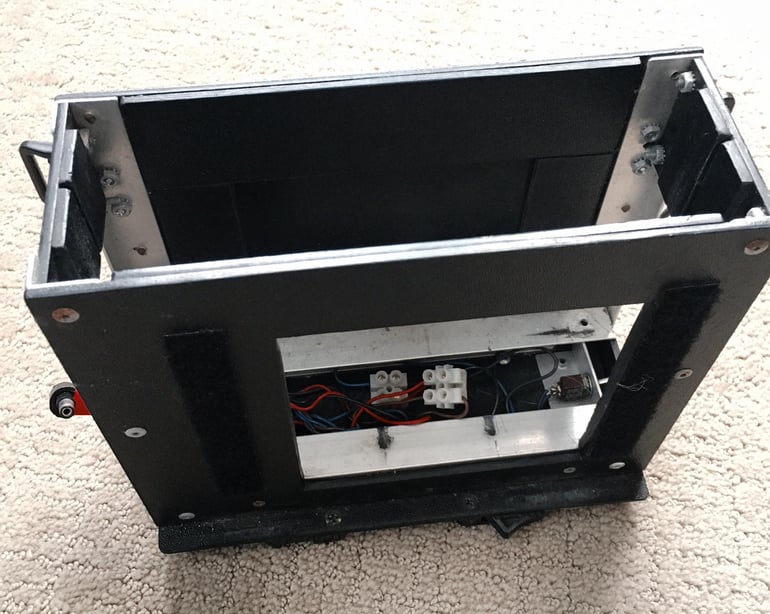
"Homemade hard case for Shure FP33 field audio mixer with built in power distribution. AB camera battery plate on the bottom." © Bernard Beaudry.
B:. Eventually, I ended up freelancing with the PBS station here in town. They’re very well known for doing nationally syndicated shows and local programming. One of the first shows I worked on was Newton’s Apple. It was on air for a long time.
Eventually, I got a staff position at the station. I mixed, or assisted on a live public affairs show which has been going for over 25 years now. It airs every Friday. Other aspects of the job were location and post production audio. I was on staff for 20 years.
A: 20?
B: Yeah. It was a good steady thing.
During my time at TPT I worked on a number of documentaries, some aired nationally. Three of of the most noteworthy projects were either nominated or won regional Emmy Awards. They were all projects where I did the majority of the location audio, and then post-production sound. So I have two regional Emmys.
A: If you’ll excuse my tardiness, congratulations on those well-deserved awards.
I don’t want to push you along but, how did you go from freelance location sound for public TV to booking gigs with the NFL and major networks?
B: A guy who crewed local hires for CBS and Fox also worked at the station. I became friends with him and he hired me for the football games. Because I was a location sound person I eventually got assigned to parab. [parabolic mic] I had the hand-eye coordination to aim it properly. Parab is actually a utility position.
A: Utility? Explain to me what that means.
B: In the sports broadcasting world, there’s a starting position called ‘Utility’. You begin coiling cable for the sideline cameras, or the cart camera. You also help set up and tear down cameras and video monitors helping where needed to get the show built. I would gravitate to the audio staff as a utility, because I also worked as an A2 on non football broadcasts. There’s an A1 position who is the main mixer in the truck and then there’s a sub mixer slash A2 who mixes the FX. The effects are the sound of the parabs, possibly crowd mics, and sends along to the A1 to include in the mix that the viewers hear at home. There is also an A2 on the field who sets up for and assists the sideline reporter, mounts the crowd mics, anything on the field. There’s also another A2 in the broadcast booth setting up for the announcers and all the audio involved there.
I have done and still do all of those audio jobs except for A1. Not only for NFL football, but college sports, NHL, NBA, and other sporting events. That includes regional Fox broadcasts.
A: Local to Minneapolis?
B: Pretty much. I travel a few times a year, but don’t do it a lot. Sports teams are here in town.
A: So you are often employed locally even if you are working on a national broadcast.
B: Right. Usually there’s a local person who puts together the local crew that joins the traveling crew to set up and work the games.
I continue to do the utility position for CBS and national FOX, because I love doing parab. [laughs]
A: Why is that?
B: I get paid to watch the game, concentrate on the game, and I’m on the sidelines. I like being on the sidelines. I get a lot of satisfaction out of hearing the crunches and catches. All the sounds of the game. I like being able to zero in until they sound good in my headphones. It’s also nice to hear the sub mixer tell you that you’re getting good stuff or maybe even an audio replay.
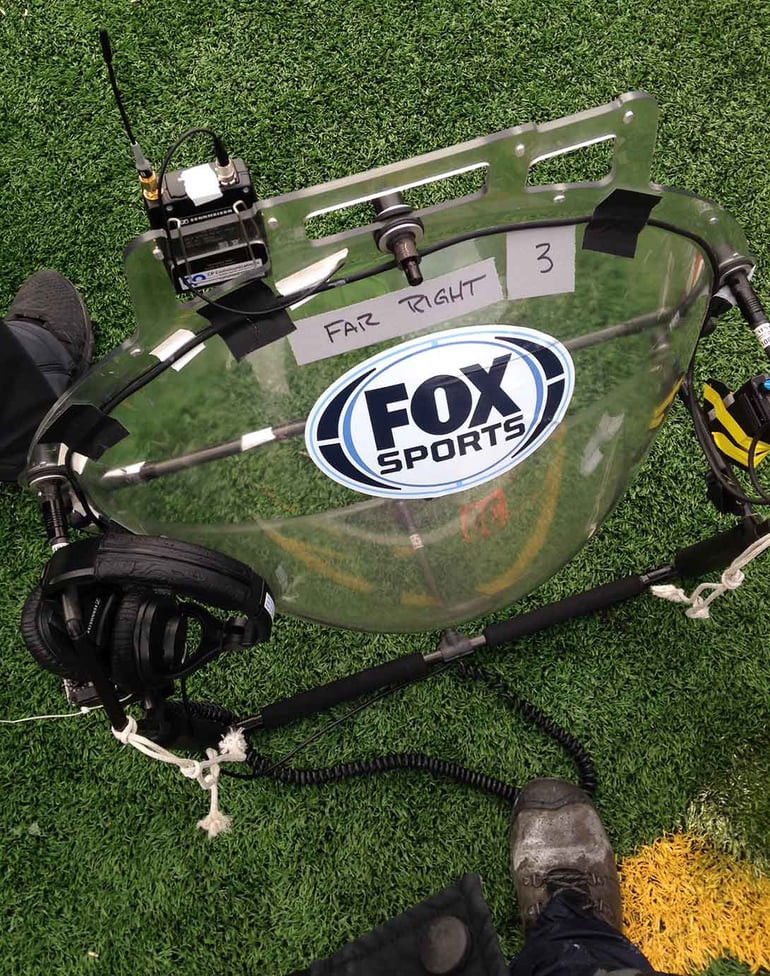
Complete wireless parabolic kit. One transmitter to sub-mixer, and one receiver for Bernie's IFB. © Bernard Beaudry. "FOX Sports" in name and form exclusive intellectual property of Fox Broadcasting Company.
A: The parabolic or ‘parab,’ as you call it, that position seems to be a very unique one because you need your ears, but you also need your eyes.
B: Exactly.
A: So which sense is more important as a parab operator? Sight or sound?
B: I would say both. You could do it only by eye, but it wouldn’t be as much fun and you wouldn’t know what adjustments you’d need to make.
There is a very small sweet spot in the directionality. If you’re right on the source of the sound, you’ll hear a nice full sound. If you aren’t, the sound is thinner and less present.
A: It’s a fine art, isn’t it.
B: Yeah. Of the four of the crew that I work on, three of us are either former or active location sound people.
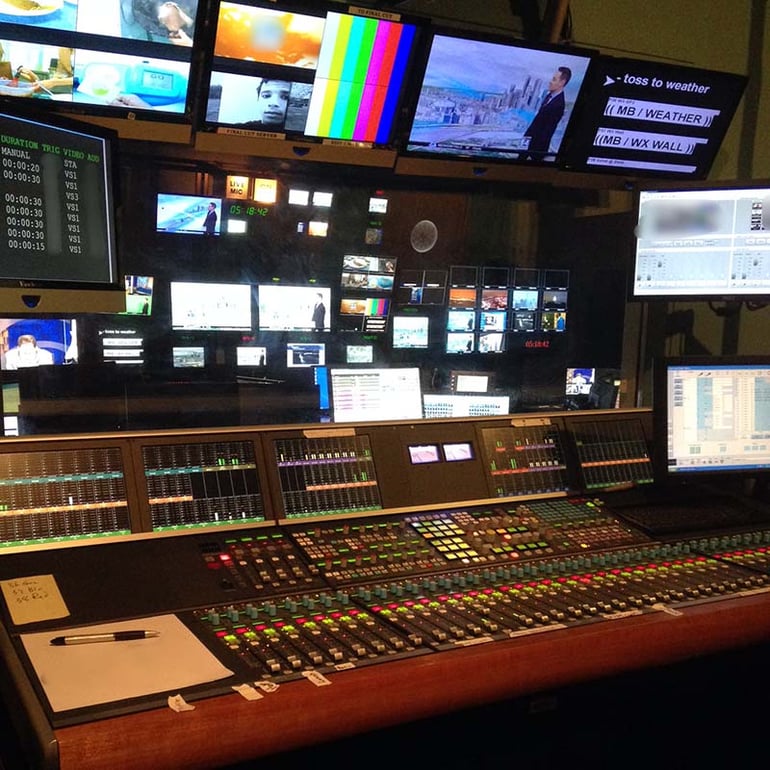
Mixing the early morning news at the local CBS affiliate, WCCO Television Image © Bernard Beaudry.
B: (contd.) That being said you don’t have to be an audio person to do a great job. There are many parab operators who don’t have the background we do and they do a great job. Our fourth crew member for example. It takes concentration, listening, and it takes aiming, not pointing—and that’s an important distinction—aim it, don’t point it.
Also, you must have a properly tuned parab to get good sound. A parab is usually an omnidirectional mic pointed to the back of the dish. What you’re doing is gathering in the sound energy and concentrating it on a spot in the middle of the dish. The distance from the omni capsule to the back of the dish will impact the distance the parab can capture really good sound.
A: In all of your years as a parab operator, are there certain clips, sound clips, do any snippets of audio you’ve captured stand out? That you feel proud of years later?
B: When you’re out there, it comes and goes pretty quick. You know you got something good when the guy who’s sub-mixing you says, ‘that was great, we got an audio replay.’ They [producers] might replay a play and the announcers will say, ‘Wow! I could hear that all the way from up here!’ It’s sort of a cliche thing for announcers to say, though in reality they are not hearing it all the way up there through the air. They’re hearing it through their foldback which has the parab mixed in.
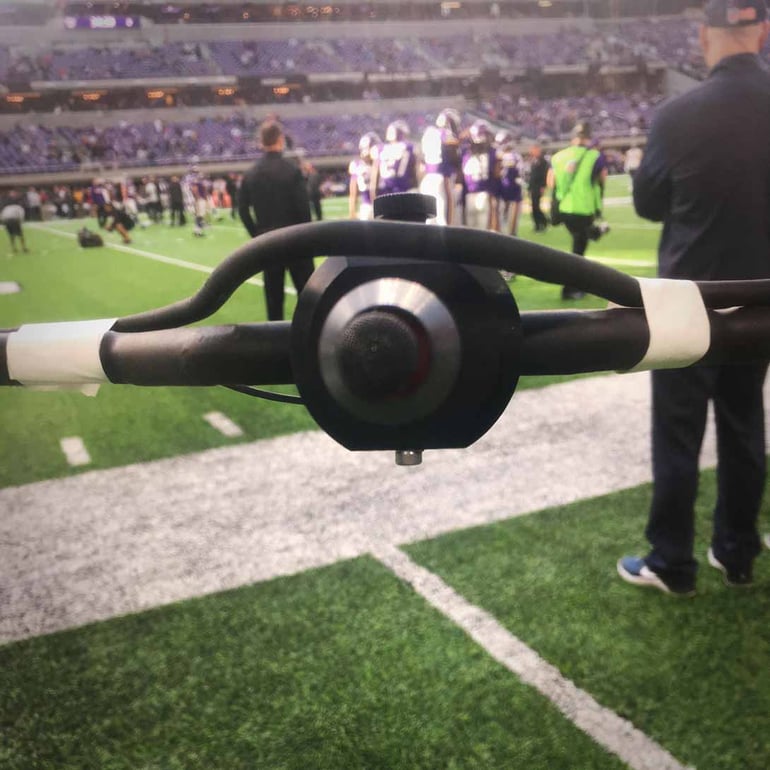
A photo snapped behind the acrylic of Bernie's parabolic dome, right down the "sweet spot," showing the moveable capsule. Image © Bernard Beaudry.
A: So it’s you they’re talking about.
B: Yeah. And then they’ll replay it again and say the same thing: ‘Whoa! we heard that up here’ and then they’ll do a sound playback. That means you really got it. You were aimed at the right place at the right time. That’s when you know you got it.
I’m also proud to say that I was there for Super Bowl XXXIX (39) in Jacksonville, Florida. FOX had the rights that year. I happened to be good friends with the A crew and I got them to take me to the Super Bowl. The most memorable thing was the halftime show with Paul McCartney.
A really nice thing about being there was I got to see all of the crews I worked with over the years in one place. It’s such a big show they needed that many people. It was great. I also made a lot of new friends and learned a lot working with people from other markets. It was a solid ten days of work, which was good. I do have to say the game itself was actually kind of boring. [laughs] They don’t let you move up and down the field so much because there are so many people there.
A: Bernie if I could interrupt. I think you are the only man alive who has ever said being on the sidelines of the Super Bowl was boring.
B: I should qualify, I mean doing parab at the game. It was a thrill to be there, don’t get me wrong, but once the players got on the field it became anti climatic.
A: But tell me more about this community, of coworkers past and present, and freelancers and acquaintances, who all converge at events. Is there a certain type of camaraderie among audio professionals unique to sports broadcasting?
B: I believe there is. I know that the folks who travel all the time usually get along well and become like a surrogate family for each other. I think our local market in Minneapolis/St. Paul has really outstanding people. They appreciate us when we work with traveling crews. We’re familiar faces. They know we’re gonna do a good job, and we care about what we do.
We know it’s only temporary, but there’s time to bond setting up a show. It’s great to see familiar faces you’ve seen over the course of ten or twenty years. And the fact that they’re still doing it and you’re still doing it, and that it’s on a national stage means that together we’ve all arrived.
A: That’s poetic.
B: [chuckle]
A: But it is.
OK. Moving on, football: I know it’s a game which has many rules. And you as a parab operator or whatever role you might be on at a game you don’t play the actual game of football, but you still need to follow rules. What are those rules?
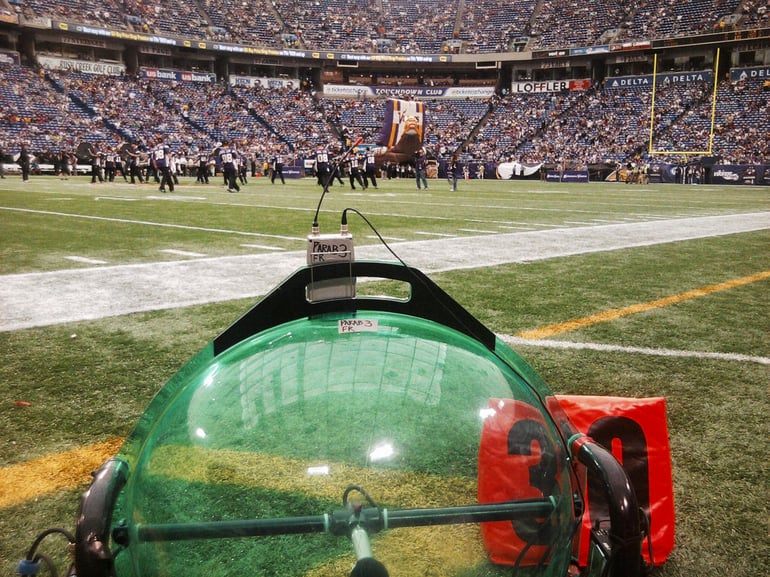
Another day on the job for Parab #3.. Image © Bernard Beaudry.
B: The general rule is, there are lines drawn that you can’t go past, and you can’t go into the player/coach area. The bench. You cannot point your parab into those areas. Only at people who are on the field, or I should say aim the parab.
We try to play nice with the still photographers and the NFL Films crew. We’re all professionals and we’re all trying to play nice together. You don’t want to bump into them or get in their shot.
A: This kind of gets us onto the subject of bodily awareness when you’re doing a professional job while there is a heavily physical game going on. Sooooooo, this is what everyone has been asking you about for the last month: the unfortunate event there with the Vikings.
When I saw that footage, I did not think it was funny. What I saw, was a potentially very dangerous situation that could have turned out much worse. Would you agree?
B: I certainly agree. If you look at the still of the impact, you’ll see if I had been one step more forward I would have been in a position that I likely would have been taken away on a stretcher—or worse.
I was only clipped by his shoulder. My nose is at the far right of his number on his jersey. So he hit my right shoulder with his left shoulder.
A: Yeah. [typing sounds] [click] Oh boy. That looks bad enough, but I see what you mean. You are a regular sized person. But that other person, number 98, that person, he is not.
B: No. He is 327. I’m 175, 5’ 7”.
A: How did you feel, emotionally, during that instant?
B: Let me walk you through from start to finish.
I was running. Which is not a good reason I should say. I could not get my IFB working. That’s how the sub-mixer feeds me instructions, so it’s important to have that working. Our instructions were to power everything up at A2 position which was on the near side of the field. I work on the far side. If there is anything wrong, you can fix it before the game and go on your way. So when I first powered up, my IFB didn’t come on even though it powered up before during our earlier check in. I was trying to sort that out with the A2. We switched batteries. Still nothing. Then the sub-mixer finally told the A2 to push the battery in forcefully before you close the door because of the larger lithium batteries. This was about ten minutes before the game. I lost track of time because I usually try to be in position 15 minutes before the game so I can power up and check my sweet spot, get comfortable in my harness. A little pre-game routine I do to get ready. All of that with the battery threw my timing off. Once it was fixed, I put on my earphones. I didn’t really have the parab volume turned up yet so I was listening to just the announcers. The earphones probably saved me from a concussion. They have very cushy noise isolating earpads.
I felt rushed. I wanted to get to my position. There was no real reason to run. I approached the tunnel and was still running. I saw they were just starting to feed the smoke into the tunnel. The tunnel by the way is a viking ship the players come charging out of.
I didn’t know this, but the players are a good 15 feet inside the ship. As I approached from the sidelines I didn’t see anybody in the tunnel because of the angle, or how far back they were. I approached the tunnel, saw the smoke, and didn’t want to slow down, which was dumb. I didn’t see anyone in the tunnel as I approached, so I thought, ‘I’ll just get across as quickly as possible, and if they do come out, I’ll have already passed.’ I was dead wrong.
A: Well, not dead wrong, thankfully.
B: Right. I was alive wrong.
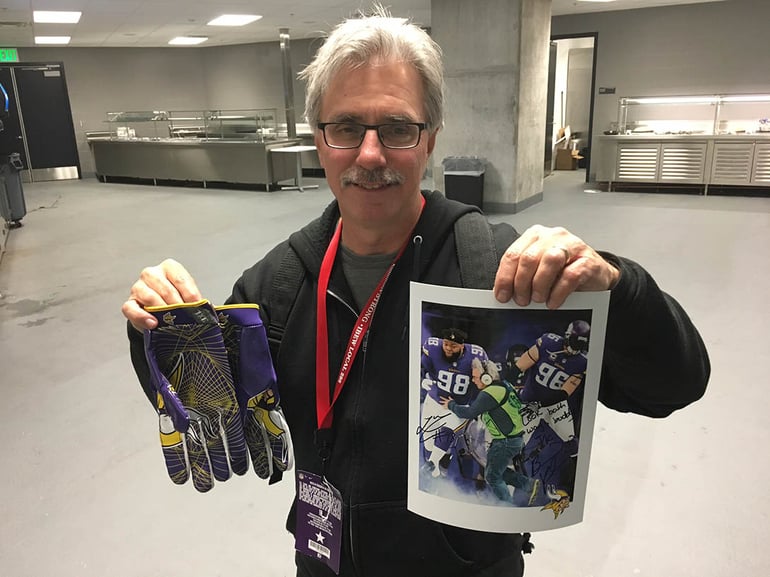
Bernie outside the Vikings' locker room after receiving Brian Robison's game gloves from that fateful day, and a photograph of the collision signed by Linval Joseph and Brian Robison. Image © Bernard Beaudry.
I remember these big flame things shoot up right before they come running out and I didn’t see them because I was looking forward, but I could feel the heat of the flames and I remember thinking: ‘uh oh,’ and that’s when I got creamed.
A: [takes a drink of something]. Man. Do you remember afterwards what happened? I know sometimes when things like this happen your memory cuts out—
B: I do. I was laying on my side. I remember the player, or somebody, helping me up, my glasses were off and there was smoke everywhere. I’m pretty nearsighted without my glasses. I was stunned. I couldn’t see very well.
Then I remember picking up my parab, and it was in pieces. Everything was dangling by wires.
A player or security guard helped me up, and I could feel blood running down my nose. I was helped over to my position, someone brought me my glasses. I put them back on and started to piece my parab back together.
A: Did you get it back together?
B: I started to put it back together. The end zone parab person came over then and helped put it back together. She then moved over to my position.
The Fox tech manager came out and said, ‘we’re talking you off the field, for sure.’
I went into an ambulance back where the video production trucks park. They cleaned my nose up—it was just a tiny little cut from the nose-piece on my glasses. I could move OK. Didn’t have too much of an issue. They did the whole concussion thing, asked me my birthday, how many fingers, etc. Twice they asked me if I wanted to go to the hospital. I said no. I want to go back to the field.
A: Now there’s a professional.
B: They said ‘are you sure?’ I said yeah. They put me on the end zone parab. It doesn’t move; it’s hardwired in the end-zone.
During halftime Fox put together a little package to show I was OK. They played the whole thing in slow motion, and the announcer said, ‘we’re going to show you the definition of tough.’ They explained what happened along with me holding the parab in slowmo, smiling. They said “he’s a little bloody, and needs a trip to Lenscrafters, but he’s still working.” I’m paraphrasing but you get the idea.
And funny enough, Lenscrafters did replace my glasses and gave me a free eye exam. Then another company gave me free glasses too.
A: It’s almost like the worst and best thing that’s ever happened to you. Well, I don’t know. You got several new pairs of glasses at least.
B: Well, I don’t have them yet. But I’m going to take them up on it.
A: You should. And you know you said earlier what happened was “dumb.” I don’t think it was dumb. I think it was just a rare accident.
B: The fact that this happened pre-game is what’s so annoying. I will say I was somewhat embarrassed, because I should have known better than to run past that tunnel.
A: Oh. I guess. But you’ve been doing it for years, and it sounds like nothing like this has ever happened to you before. Everybody gets one, right? And thankfully you weren’t injured.
B: Right. But it so happened I was on the A crew so it was a nationwide broadcast.
A: [laughs] Even so, I think a lot of people would love to do what you do, and would be willing to break more than their glasses to get there.
I have one more question. As an audio professional who works within line-of-sight of several dozen broadcast cameras, you must see yourself on television all the time. Under normal circumstances, say, when you are not being trampled by humungous armored men, how do you feel when you see yourself on TV?
B: I consider myself a modest person, but it does give me a little bit of satisfaction to see myself on TV if I’m doing my job right. Then it’s kind of fun. I don’t want to get on TV, but it’s hard not to.
There are people I’ve worked with—talent, producers, mixers, whoever—who actually look for me at games if they know I’m working. They’ll text me screenshots of their TV showing me on the sidelines. A producer friend of mine told me, ‘we have a drinking game. Whenever we spot Bernie, we have a drink.’
A: [laughs. hard.]
B:Though I will say, the outpouring of support after what happened is […] overwhelming. I know many crew people, I’m also on a lot of Facebook groups, and forums, like JWsound. So many people I’ve never met in person have asked, “dude, are you OK?”
A: As someone who also doesn’t know you, I’m glad to hear it’s more than snarky headlines. Not to mention Lenscrafters. Although they’re a little late on their shipment, aren’t they?
B: I just need to set up the appointment, but work keeps getting in the way.
Please address editorial enquiries to alex@rfvenue.com, and leave comments below.
Thank you to Bernard for all photographs. Bernard Beaudry grants limited permission to RF Venue, Inc. for the use of these photographs. Bernard retains all rights to photographs accompanying this article and prohibits their re-use in any form.
Alex Milne
Alex Milne was Product Marketing Manager and Digital Marketing Manager for RF Venue, and a writer for the RF Venue Blog, from 2014-2017. He is founder and CEO of Terraband, Inc., a networking and ICT infrastructure company based in Brooklyn, NY., and blogs on spectrum management, and other topics where technology,...
More from the blog
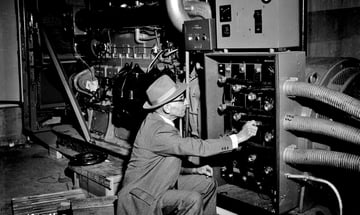
Knowledge Guides
Wireless Microphone Compliance Guide for Small Entities Hits the Books
2 min read
| December 15, 2014
Read More

A New Chapter Opens for the RF Venue Blog
1 min read
| December 17, 2014
Read More
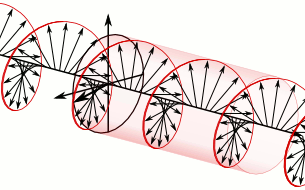
CP Beam Antenna
Why Helical Antennas Give Better Wireless In-Ear Monitor Reception
2 min read
| December 15, 2014
Read More
Subscribe to email updates
Stay up-to-date on what's happening at this blog and get additional content about the benefits of subscribing.

